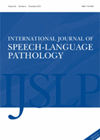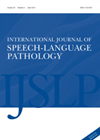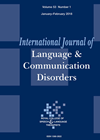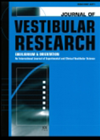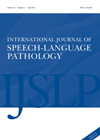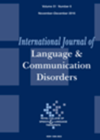
Journal Reviews
A song for my future self
People with aphasia experience a loss of friendships and social networks and, with this, a loss of identity. Interventions targeting participation, social and emotional wellbeing for people with aphasia have received more attention in the research literature. Storytelling is a...
Doing it for the people: how to do speech and language therapy
This review article distils 58 studies, collating information from people with aphasia, their families and clinical speech and language therapists summarising the seven habits of highly effective aphasia therapists. Habit 1: Effective therapists invest time in and prioritise relationships with...
Humour to improve clinician - patient interactions
This study examined the role of humour employed by the speech language graduate student during their one-on-one therapy sessions with people with aphasia (PWA). The students used humour to soften the errors made by the clients; to equalise interactional power;...
Help or hinder: how and why do SLTs make clinical decisions around swallowing?
Dysphagia is a relatively common consequence of stroke, with estimates between 50% and 60% of people presenting with swallowing dysfunction following stroke. It is associated with pneumonia, malnutrition and dehydration which in turn lead to increased length of hospital admission,...
Is clinical HIT as good as vHIT in the emergency room?
Establishing the cause of acute vestibular syndrome (AVS) is critical in the first few hours of presentation in the emergency department. The first question to ask is, “is it due to a peripheral vestibular pathology or a stroke?” This is...
We all need to support the human rights of people with communication difficulties
This article starts by reminding us of the Universal Declaration of Human Rights (United Nations, 1948) of which article 19 stated: ‘‘Everyone has the right to freedom of opinion and expression; this right includes freedom to hold opinions without interference...
Verbal memory and chronic speech and language disorders following stroke
Stroke is often associated with chronic language disorders like aphasia and apraxia as well as memory impairments. Studies have found that memory problems in stroke are often verbal memory disorders. This review article discusses the association between language and short-term...
Early intensive aphasia therapy in stroke patients
The impact of aphasia following stroke is devastating. Very early aphasia rehabilitation studies have been the subject of ongoing debate. This paper describes the comparison of a very early aphasia therapy regimen with a historical ‘usual care’ control group after...

